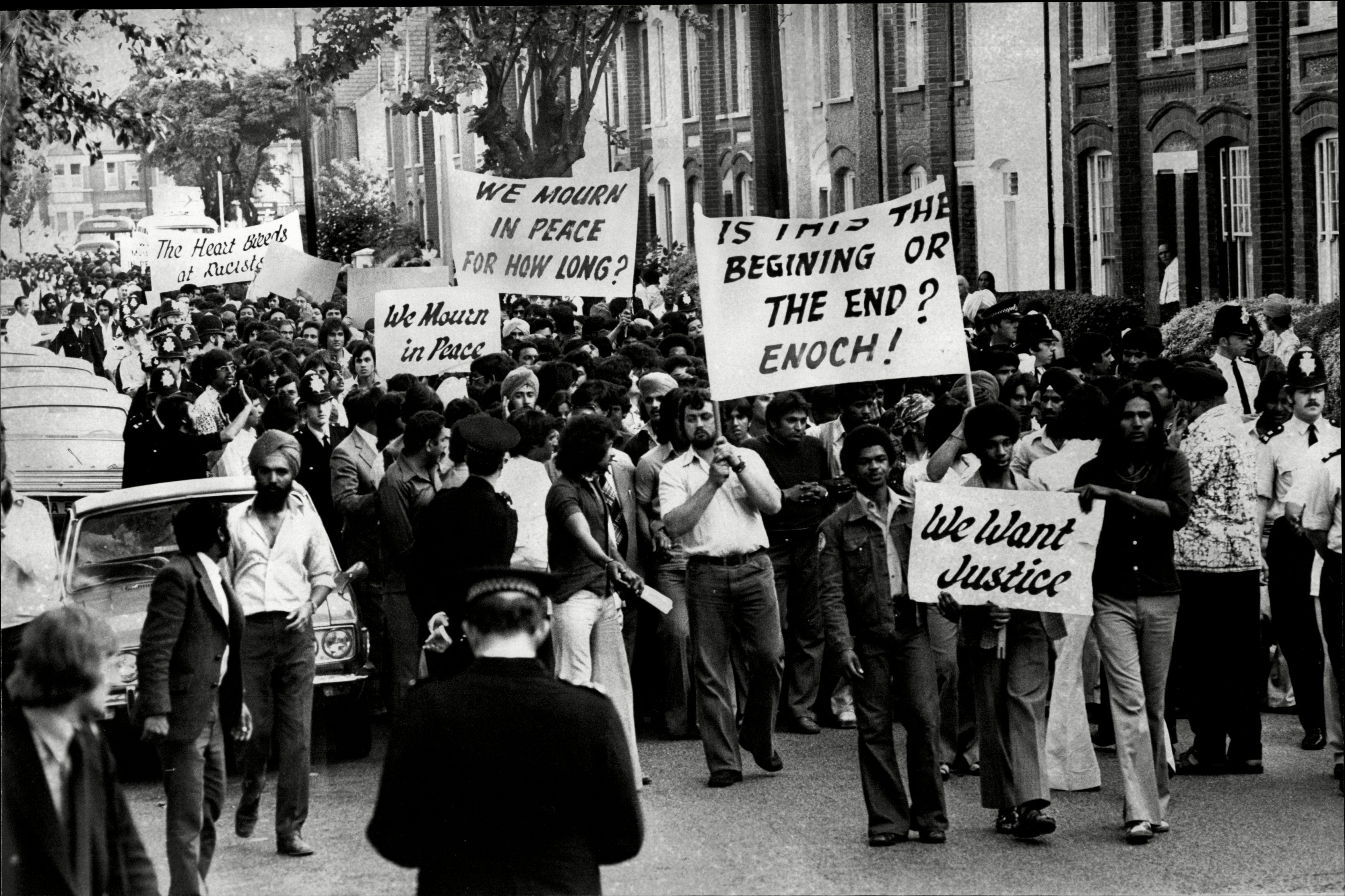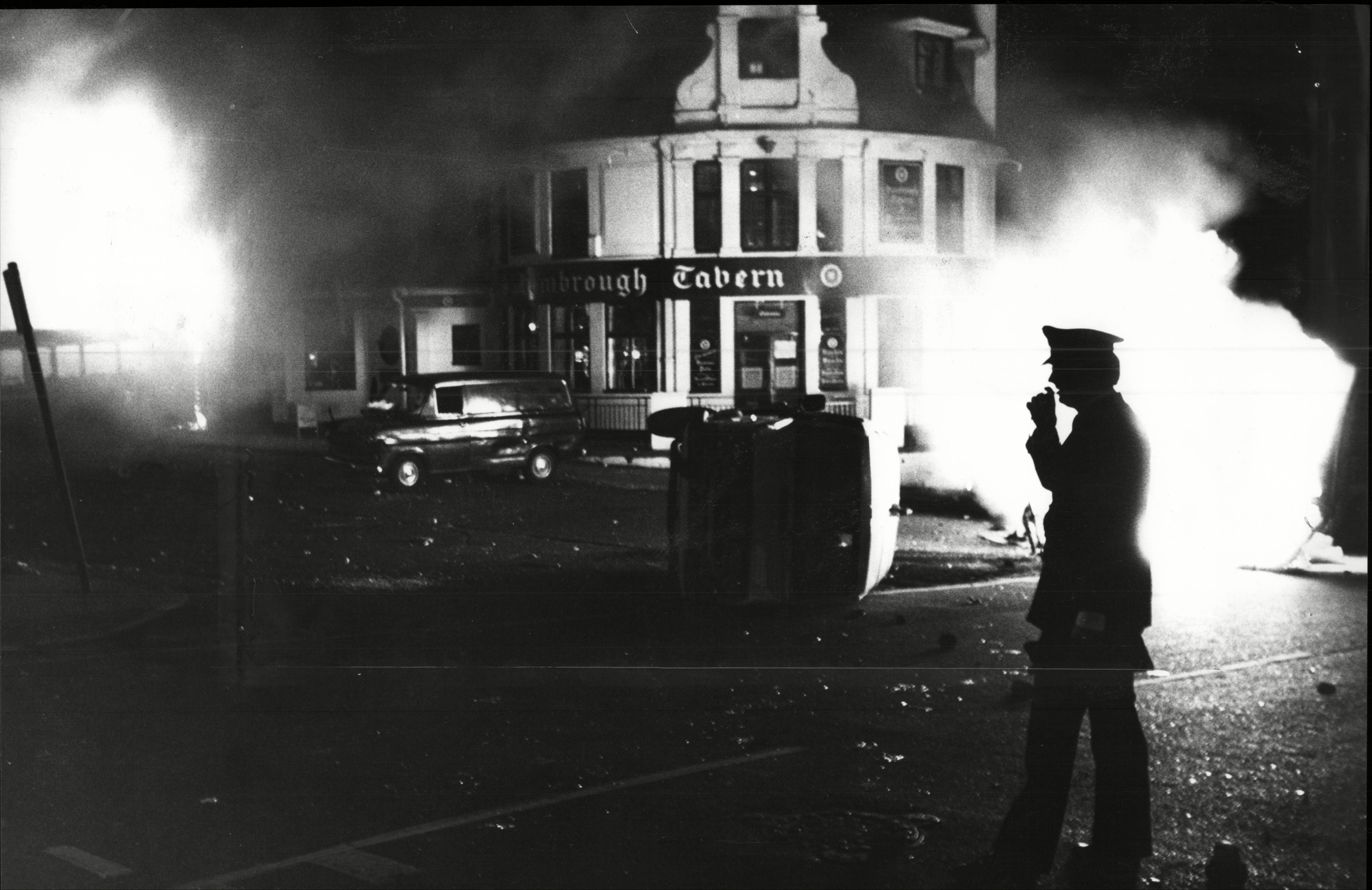
Support truly
independent journalism
Our mission is to deliver unbiased, fact-based reporting that holds power to account and exposes the truth.
Whether $5 or $50, every contribution counts.
Support us to deliver journalism without an agenda.

Louise Thomas
Editor
A Riz Ahmed documentary released earlier this year, may have shed light on the hidden history of British-Asian resistance to the violence of the 1970s and 1980s – Britain’s era of “P***-bashing”, skinheads and the National Front.
As anti-racist protesters took to the streets of the UK in a display of defiance against the far-right on Wednesday (7 August), many were eager to point out that such movements have a long, but too often unknown, legacy.
“What is happening now has been happening time and again here,” wrote one social media user.
Defiance: Fighting the Far Right, produced by the Bafta and Emmy award-winning Rogan productions followed the acclaimed series, Uprising, which documented events relating to the black community during the same period.
Created in conjunction with Oscar-winning filmmaker and producer Riz Ahmed’s Left Handed Films, responsible for his Academy Award winning short film The Long Goodbye, it was released to much acclaim.
Defiance follows the protests sparked by three key mobilising events: the murder of 19-year-old Sikh youth Gurdeep Chaggar in Southall by neo-Nazi skinheads in 1976, the killing of Muslim father Aftab Ali near Brick Lane in 1978, and Parveen Khan and her three children including a baby, who perished during an arson attack on their home in Walthamstow in 1981.
The attacks led to a wave of resistance and protests by British Asians, during which period a series of landmark arrests, judgments, and laws were made.
“I was too young when a lot of this was going on but I’d hear stories from my uncles about really having to fight to survive,” Ahmed, 41, told BBC Radio 4.
“Sometimes that fight would be against the far right, sometimes it would be police officers who wanted to trouble some lads who were fresh to the country.”
“Sadly, it’s a history that not many people are aware of,” Ahmed continued. “One of the aims of this is to take people on this ride and open their eyes to this rich history of defiance in the face of the rising far right.”

Watch Apple TV+ free for 7 days
New subscribers only. £8.99/mo. after free trial. Plan auto-renews until cancelled

Watch Apple TV+ free for 7 days
New subscribers only. £8.99/mo. after free trial. Plan auto-renews until cancelled

It’s a sentiment that director Satiyesh Manoharajah, echoes. Manoharajah produced and directed Emmy award-winning TV series Stanley Tucci: Searching for Italy and Vishal an acclaimed BBC podcast on the kidnap and murder of a young Asian boy on the day of Charles and Diana’s wedding.
“One of the things that’s so interesting is that these look like unassuming uncles and aunties, but they were beating up fascists on the street,” he told The Independent.
“I don’t know where this idea of Asian people being meek comes from. People think we came here, worked hard and kept our heads down- and then Rishi Sunak became prime minister.

“But in the middle there was a lot of pain, and people had to fight for their lives. They did fight and they won. We know all about Martin Luther King and the movements in America - but this was our civil rights movement here in Britain.”
Someone who knows about fighting for their life is Suresh Grover who arrived on a “beautiful ship” in Folkestone aged 10, to a mob of right-wing protestors shouting at him to go back home.
Grover recalls being asked, “Are you Tarzan’s son?” by teachers while at a school in Lancashire. He remembers the popularity of far-right politician Enoch Powell, with “Enoch!” often shouted out in class as a rallying cry to intimidate others.
“It was the era of ‘p***-bashing’. One Asian boy brought a penknife into school because the teachers did nothing. It soon stopped,” he said.

He has since gone on to coordinate campaigns for Stephen Lawrence and Victoria Climbié and is working on supporting the victims of a number of racially charged murders, including the death of 13-year-old Christopher Kapessa in 2019.
But he says that the scars from that time, both physical and emotional, remain.
“I still have marks from where I was stabbed in my temple and legs,” he told The Independent. “I’m still conscious of it. Even though things have changed, it was not long ago that I was called a ‘p***’ on the street.”
Anoop Pandhal, series producer for Defiance, believes there is a message in the series that is pertinent to this day, although countless stories, deaths and events were left out due to time constraints.

She told The Independent, “It kind of shows how far it can go when you ignore what people are telling you, you know it’s like the death of Gurdeep Chaggar, which is bad enough in itself, but they get very lenient sentences.
“Parveen Khan shows that racism escalated and escalated to such an extent that people were dying in their own homes while they were asleep at night with their family. Imagine being killed along with your family?”
Pandhal continued: “When I was doing that story I thought a lot about Parveen Khan and her three children, and I felt like I’m doing this for her and for them.”
Although it has taken over 40 years to tell the story, Ahmed believes, “For a whole swathe of the country, I think this is going to give them chills.”
Rajesh Thind, also a director on the series, said “Things are changing” when it comes to media representations of diverse communities.
“I think it’s a lot of things, it goes all the way to the beginning of Channel 4 which was set up to be a space for marginalised and minority voices.
“Also, at this point there are Black, Asian, East Asian, professionals working in the industry. People like me and Satiyesh and many other people who have been doing this for a long time. Even that’s not telling the whole story because there have always been those people but there have been glass ceilings, and careers cut short because they haven’t got the next promotion.
“So, I think these things are a long time coming.”
Meanwhile, the Nightcrawler and Four Lions actor took to social media to add, “Proud to tell this story. Proud of our history. Our future depends on knowing it. We stand on the shoulders of these giants.”
Defiance: Fighting the Far Right is available on Channel 4 On Demand.







